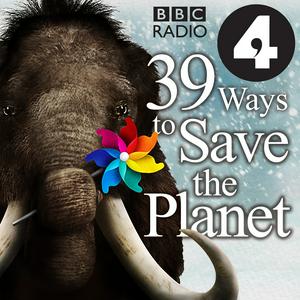39 Ways to Save the Planet

41 episodes

Zero Carbon Farm
22/7/2022 | 13 mins.
Can British farmers transform themselves into carbon-cutting heroes? Arable farmer, Duncan Farrington has worked hard to reduce the carbon emissions from his farm. He's replanted hedges and trees and cut down on diesel-powered machinery. He's even persuaded some of his staff to cycle to work. But Duncan's farm isn't just zero carbon, it's actually sucking in and locking up vast quantities of carbon dioxide from the atmosphere.Duncan explains to Tom how he's transformed the management of his soil and proven to doubters that commercial British arable farms can play their part in cutting the planet's carbon emissions.Producer: Alasdair Cross Researcher: Sarah GoodmanProduced in conjunction with the Royal Geographical Society. Particular thanks for this episode to Dr Adrian Williams of Cranfield University and to Professor Andrew Barnes, Professor Mads Fischer-Moller and Professor Bob Rees of Scotland’s Rural College (SRUC).

Hydrogen Revolution
18/11/2021 | 12 mins.
It could be the clean fuel of the near future- for homes and for heavy machinery. Lord Bamford, head of JCB, is betting that it will power the next generation of emission-free tractors, diggers and loaders. Tom Heap meets the JCB team and discusses the pros and cons of hydrogen with climate scientist, Tamsin Edwards of King's College, London.Producer: Alasdair Cross Researcher: Sarah GoodmanProduced in association with the Royal Geographical Society. Special thanks for this episode to Mickella Dawkins at Loughborough University and from the University of Edinburgh, Dr Katriona Edlmann, Dr Romain Viguier and Dr Ali Hassanpouryouzband.

Arnold Schwarzenegger's favourite ways to save the planet
29/10/2021 | 14 mins.
Arnold Schwarzenegger is the former governor of California and one of America's most influential green voices. He's also one of the biggest movie stars in the world and a big fan of the innovators, activists and entrepreneurs featured in the previous 39 episodes of this series. In this final programme, the Terminator star discusses his favourite ideas from the series with Tom Heap and looks forward to the crucial climate change talks in Glasgow in November.Producer: Alasdair Cross

Hunting Down the Polluters
25/10/2021 | 13 mins.
Tom Heap discovers fresh ways to quantify greenhouse gas emissions with help from satellites, artificial intelligence and former US Vice President Al Gore.Emissions data from companies and countries can be inaccurate, incomplete or sometimes just plain deceitful. The team at Climate TRACE, led by Al Gore, have devised innovative ways to calculate accurate emissions data from power stations, factories, ships and even planes. That data can be used to reveal unexpected sources of carbon dioxide and methane and to provide independent figures for international negotiations on climate change. Producer: Alasdair Cross Researcher: Sarah GoodmanProduced in association with the Royal Geographical Society. Special thanks for this episode to Professor Raphael Heffron from the University of Dundee and Professor Paul Palmer from the University of Edinburgh. Image courtesy of Transition Zero.

Low Carbon Crisps
25/10/2021 | 13 mins.
Ever thought about the carbon cost of a packet of crisps? At CCM Technologies they think of little else. Their revolutionary fertiliser offers a big step to carbon-free snacking.Waste from crisp factories or from sewage treatment works can be routed and treated to form the basic building blocks of new fertilisers that can be spread on the ground to grow a new harvest of potatoes- or any other crop we need. The system avoids waste and takes a big cut out of the carbon emissions of traditional fertiliser production. Tom Heap tours the CCM fertiliser plant on the outskirts of Birmingham and discusses the carbon benefits with Dr Tamsin Edwards of King's College London.Producer: Alasdair Cross Researcher: Sarah GoodmanProduced in association with the Royal Geographical Society. Special thanks for this episode to Dr Kate Schofield from the University of Plymouth and Dr Abigail González Díaz from the National Institute of Electricity and Clean Energy.
